North Carolinians still favor keeping Confederate monuments. Here’s what has changed.
- Oops!Something went wrong.Please try again later.
For more than a century, everyone who approached North Carolina’s historic Capitol building on Hillsborough Street was met first by a Confederate soldier statue. Now the view is simply the historic building itself.
What to do with Confederate monuments removed by protesters and the governor in the summer of 2020 — and what to do about a long-planned monument to African Americans on the grounds of the Capitol — are questions that have both been stalled out for several months.
That could change this spring.
“We’ve heard the public loud and clear, that we have to reevaluate the value of what the public pays for as far as these public spaces and what we see, and telling all of our history. We can’t just talk about the good stuff,” said state Sen. Natalie Murdock, a Durham Democrat.
At the same time, a new Elon University Poll shows changing attitudes among North Carolinians about the placement and prominence of Confederate statues across the state. Most favor keeping Confederate monuments, but more want them removed now than they did when polled in 2019, before the summer of 2020 and Black Lives Matter protests after the police killing of George Floyd in Minneapolis.
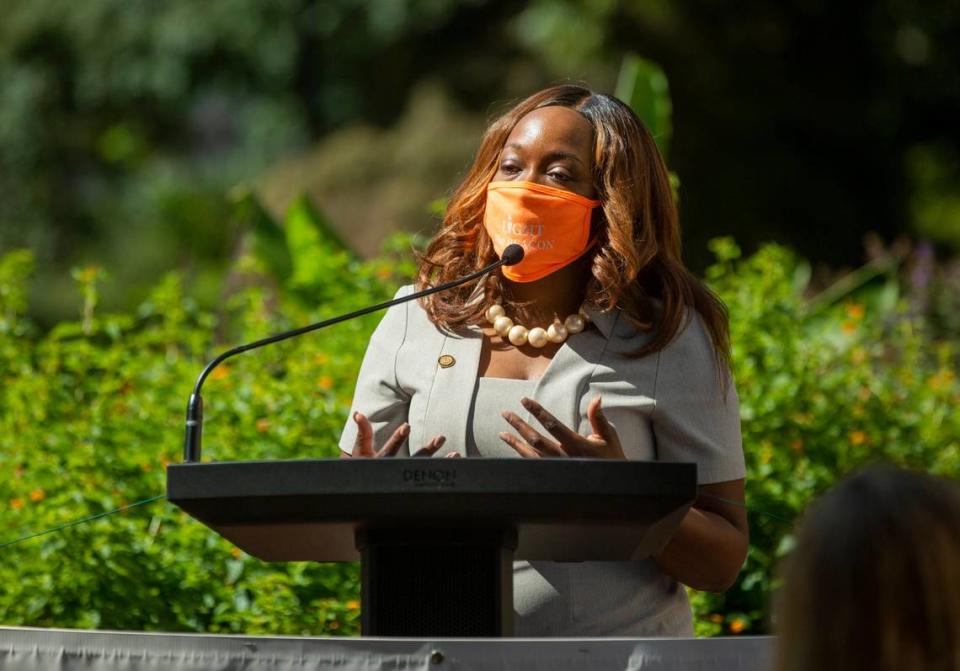
Support for removing Confederate monuments
In a new Elon Poll, 31% of people said that the killing of Floyd and other events in 2020 make them more in favor of removing Confederate monuments. However, 51% said it made no difference, and 16% were less in favor after 2020.
A majority of those polled think that Confederate monuments should remain in public spaces, but the percentage who want them removed has increased from 34% to 41% since 2019.
Asked, “Do you think removing Confederate monuments from government property mostly helps or mostly hurts race relations, or does it not make much of a difference?,” 28% said in 2021 the monuments’ removal helped, and 39% said it mostly hurt race relations. That was about a 4% increase in both categories since 2019.
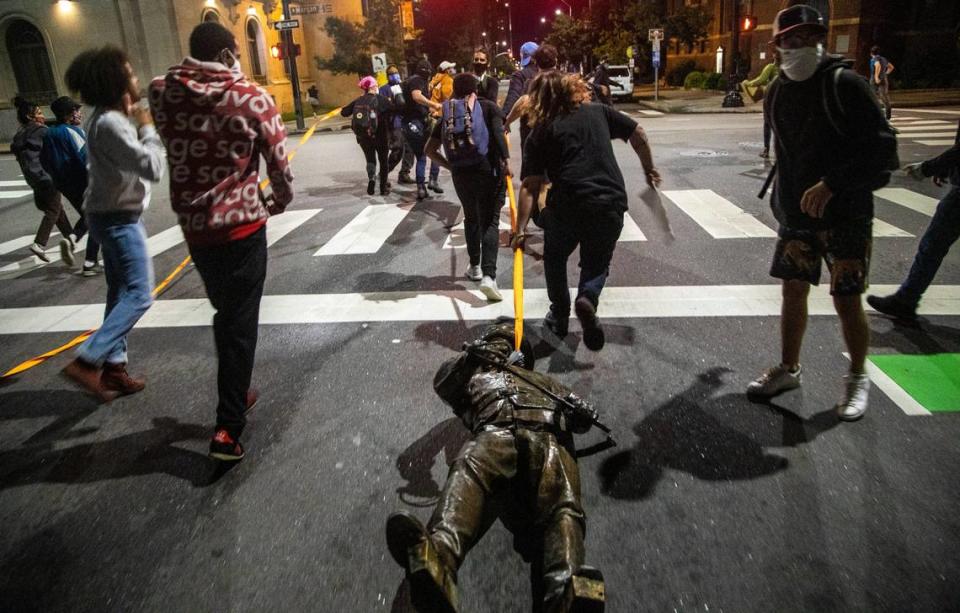
Another question asked both in 2019 and 2021 showed a 4% increase in people who think the main cause of the Civil War was slavery, now at 48%, with 51% saying the main cause was states’ rights.
As far as where to put removed Confederate monuments, a majority — 62% — support moving them to history museums. Also, 54% of those polled supported moving them to Confederate cemeteries or memorials. There was 64% support for adding plaques with historical context.
Just 36% support replacing Confederate monuments with monuments to honor Southerners who fought to end slavery. For those monuments that remain, 43% said it was a “good idea” to increase security around them to prevent them from being damaged.
Elon University, in partnership with The News & Observer, Herald-Sun and Charlotte Observer, questioned 1,395 North Carolina adults in an online poll March 30-April 2. Of those polled, 21% are Black.
Read full poll results at elon.edu/u/elon-poll.
2019 budget battle, 2020 protests
A year before the 2020 Black Lives Matter protests, and when Confederate statues were still standing in downtown Raleigh, it seemed that $2.5 million for a monument honoring African Americans on the Capitol grounds would come to fruition. But plans for the grounds, called Union Square, changed.
The 2019 budget battle between Democratic Gov. Roy Cooper and the Republican-majority General Assembly wasn’t about statues. It hinged on teacher pay and Medicaid expansion. But within Cooper’s proposed budget was $2.5 million for the long-planned monument on the state Capitol grounds. It also included $1.5 million for Freedom Park, which would also honor the Black experience in North Carolina, and be built on the block between the Executive Mansion and the Legislative Building. The state budget passed by the General Assembly also included both projects. But Cooper vetoed the budget over other issues, and legislation passed later included funding for Freedom Park, but not the new Capitol monument.
The state House dropped the funding just days after protesters had torn down statues of Confederate soldiers on the Capitol grounds and dragged them through the streets of downtown Raleigh in 2020. Cooper ordered the remaining monuments removed soon after.
Freedom Park broke ground last fall.
On the Capitol grounds itself, temporary metal fencing up since the 2020 summer protests was removed just a few weeks ago. The N.C. Department of Public Safety told The N&O in February the fencing remained up for so long because of security threats.
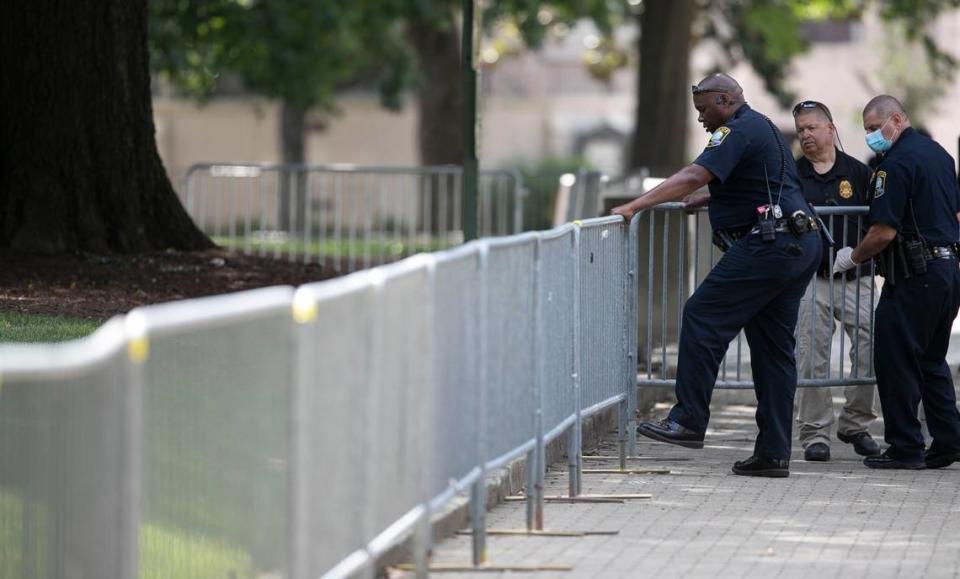
The News & Observer asked the Department of Administration in February, by phone and email, about the status of the Confederate statues and plans for the space. The department has not responded to a list of questions.
Cooper’s budget proposal again includes $2.5 million for a monument to African Americans on the Capitol grounds.
On Tuesday, Cooper told The News & Observer during a news conference that he thinks there’s a lot of support for it still among lawmakers, including Republicans.
“We hope that it can be part of the final budget proposal this year,” Cooper said.
The governor said Tuesday the Confederate monuments are in storage now, and that the N.C. Historical Commission will make the decision regarding what their next placement will be, with several sites under consideration.
But the historical commission’s leader does not want the group to become the place for “all things monuments.”
The commission’s most recent meeting was held in March and did not have the Capitol monuments on its agenda, though Commission Chair David Ruffin told the rest of the members at the end of the meeting how he thinks the process should move forward. The Department of Natural and Cultural Resources deputy secretary position is vacant, so Ruffin wants the subcommittee working on the recommendations to wait to convene once a new deputy secretary is hired and in place to lead the work.
Earlier in the meeting, commissioners denied a request to preserve a monument to former governor and Sen. Zebulon Vance in Asheville, saying they are not granted the authority since the monument was on local, not state property.
Ruffin said the commission “performs primarily an advisory role and is not a general court of justice and therefore, thereby not an appropriate adjudicator of all things monuments.”
He also said the commission “should not be seen by elected officials as a forum for deciding all issues that they themselves have difficulty in solving.” Ruffin said the commission is requesting “very specific” recommendations from the department on the disposition of these monuments.
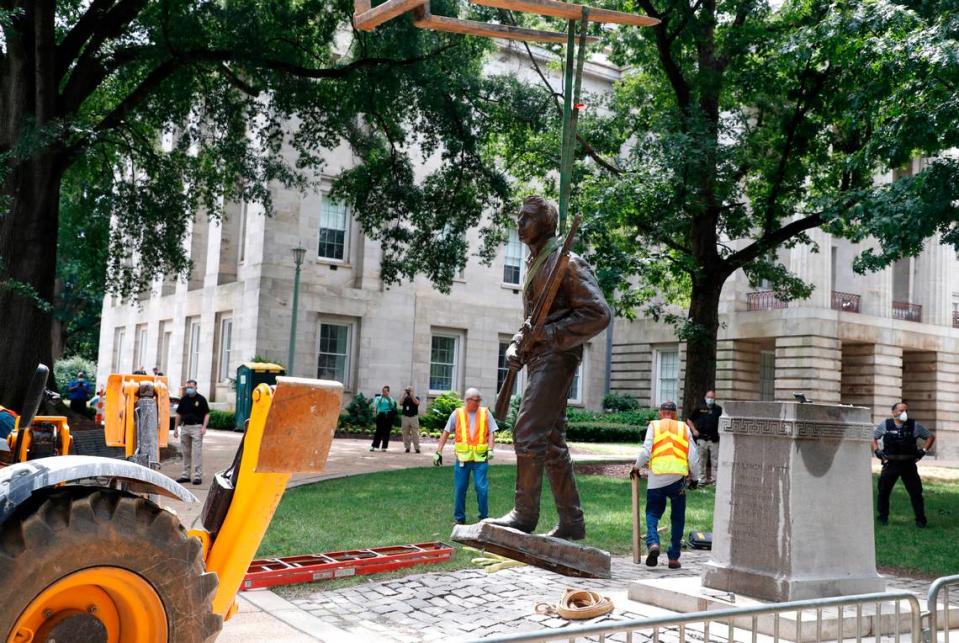
Freedom Park
One project that was not a casualty of the 2019 budget fight was Freedom Park, which was funded through separate legislation in a bill signed by Cooper in the summer of 2020. The funding came through in the wake of the protests downtown after Floyd’s death, passing the General Assembly in the pre-dawn hours of the last night of a short session.
“North Carolina has something important to say to the rest of the South, to the nation, and to the world, about what we believe it means to be a Southerner in the 21st century, about what we aspire to achieve and become, about the history that we now can affirm and embrace, and about what we want our legacy in public art and public spaces, to be,” Reginald Hildebrand, historian and Freedom Park board member, told The News & Observer in 2020.
The project is at the corner of Lane and Wilmington streets, just across the street from the Legislative Building and a few blocks from the Capitol grounds. It broke ground in October 2020.
The 2021 budget season looks more promising for a Capitol monument. Cooper and the General Assembly’s Republican leadership, Senate leader Phil Berger and House Speaker Tim Moore, have already compromised this year on schools reopening and could also reach consensus on passing the budget.
Berger spokesperson Lauren Horsch said Wednesday that the Senate is still working on its draft state budget, noting that the chamber previously passed funding for the Capitol monument and Freedom Park in the vetoed budget and in separate legislation. She said budget writers continue to consider funding proposals.
The Legislative Black Caucus included $2.5 million for the Capitol monument in the list of priorities it sent to the governor and leaders of the House and Senate, which also included increased funding to historically Black colleges and universities and other proposals.
Murdock, the state senator, was part of the Freedom Park plans since before she ran for office. She said that process exposed the need to have more representation of African American history and heritage in public spaces.
Murdock said Wednesday that Freedom Park’s construction should begin later this year after contractor bids and private fundraising are completed.
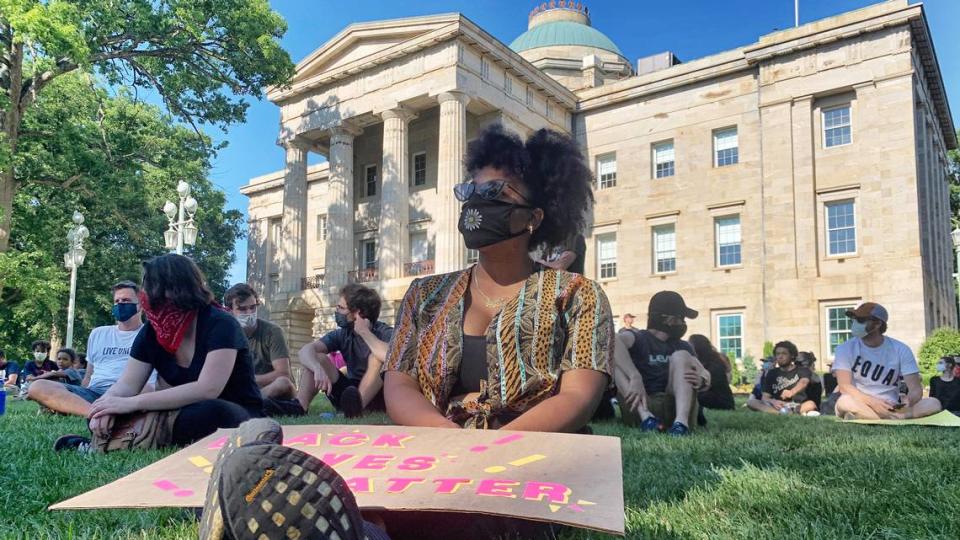
Capitol monument plans
The state decided more than three years ago that the monument to African Americans would be targeted to schoolchildren, who are the most frequent visitors to the Capitol. In the past those children were met with monuments mostly featuring white men and the Confederacy. There are no named women on the Capitol grounds — only the Lady Liberty statue at the World War I, World War II and Korean War Memorial and the now-removed statue of a nameless Confederate woman and child.
The state’s recommendations for the monument followed meetings of the Historical Commission and N.C. African American Heritage Commission, a monument study committee and community meetings.
Recommendations for the monument include: that it encapsulate the African American experience in North Carolina; be historical and commemorative; complement other monuments; depict all periods of history; use bronze and granite materials; have a bas relief timeline on the small hill along the Wilmington Street sidewalk; and be grounded in North Carolina history. Guidelines also noted the location of the southeast corner of Union Square, which was then the only vacant area.
Cooper’s second term also brought a new secretary of the Department of Natural and Cultural Resources, Reid Wilson. He told The N&O in a recent interview that $2.5 million is needed as a capital project in the state budget to make the monument on the Capitol grounds a reality.
“It can’t happen without that,” he said. Wilson said the monument is “more than appropriate” to be built.
“It is a critically important piece of our state’s heritage. The Capitol Square is where we visibly honor our state’s most important history and ideas,” Wilson said.
While Cultural Resources oversees the Capitol state historic site, the grounds themselves are under the jurisdiction of the Department of Administration. Wilson said he does not know where the removed Confederate monuments are located now.
Cooper said this week that they are in storage and plans for their future are up to the Historical Commission, which is part of Cultural Resources.
Wilson said they don’t need to redo any design process recommendations. Once the monument to African Americans gets the funding green-light, a project on pause for years will be a go.
For more North Carolina government and politics news, listen to the Under the Dome politics podcast from The News & Observer and the NC Insider. You can find it on Pandora, Spotify. Apple Podcasts. Stitcher. iHeartRadio. Amazon Music, Megaphone or wherever you get your podcasts.

